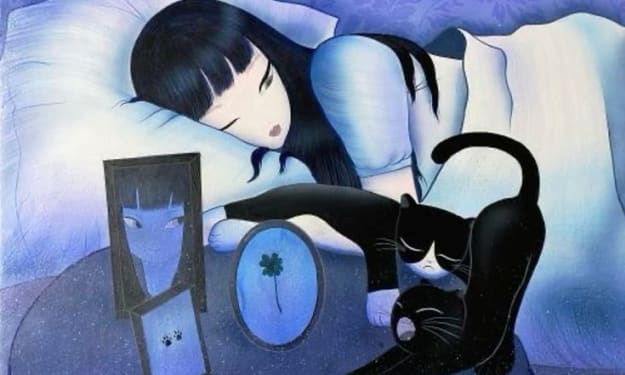Goodbye, Mr B
A mid-life middle-management crisis.

Struggling to his feet and pushing his bent wire-rims back up his bloodied nose, Arthur Bletchley was overcome with the unbearable feeling that everything in his life up until that moment had been a sham, a farce, an extravagant charade – and not the kind that he liked to play at dinner parties.
It was a strange feeling, not only because it felt as if his entire reality was buckling faster than his arthritic knees, but mainly due to the fact that he couldn’t remember much of his life at all. He had spent what he guessed was no small number of decades locked into the same tedium day after day, such that it was almost impossible to distinguish one from another. Thinking about it now, it dawned on Mr Bletchley that this chaotic morning was all that stood out in his memory, amongst an endless chain of repeating yesterdays.
Mr Bletchley was, in every respect, diminutive. A small man from a small town with a small life. A stoic man, though only in the sense that he lacked the courage to complain, with notions of propriety so archaic that his very description reeks of Regency pomp. It could be said that there was little expected of him, but that would be disingenuous. The fact is that there was hardly any consideration of him at all, in any sense, by anyone who knew him. Although, this didn’t prevent him from fabricating expectations for himself.
Where many would take such a life for the blessing that it is – the life of a face in the crowd, the ability to do or do not without murmur or repercussion, the anonymous freedom of insignificance – Mr Bletchley met it with an inescapable anxiety.
Never wanting to excel to any degree that was – as he would see it – unbefitting to his low station, Mr B – as he preferred to be known – spent inordinate amounts of time devising ways to keep himself one step behind the flotilla of middle-managers, quality-assurers, and productivity supervisors around whom he bobbed and swayed.
This was no mean feat; Mr B was an innately exceptional bureaucrat. Had any amount of the excessive energy he spent in pursuit of this handicapping been placed elsewhere, he may have been a brilliant man. Yet, in his mind, brilliance and the attention it tows behind were far too much of an embarrassment to consider as a viable life path. In short, Mr B was entirely, intentionally, sublimely useless. At least, he was until today.
The previous morning had begun like any, every, other: in a haze. Since having been made responsible for opening the bank premises – this was by no means a promotion, more a recognition of diligence, but it still irked him – Mr B would wake violently to the blaring of his alarm clock at three-thirty in the AM every morning, bar Sundays.
In order to secure something close to the governmentally-guided amount of sleep, he had tucked himself up with a lukewarm cup of decaffeinated tea and an easily digestible Swedish murder mystery novel at approximately seven-seventeen PM. His neighbours had less relaxed plans. The garbling roll of conversation, punctuated by shrill laughter and clinking crockery, pierced the thin beige wall and thinner, beiger ceiling that separated Mr B’s eardrums from the raucous get-together at the Bunt residence late into the evening.
Had his neighbours known that anybody lived next-door, they might’ve invited Mr B along. As it was, he came and went quietly at very unsociable hours, didn’t own a car, and wasn’t tall enough to be seen over the hedge that divided the driveway. So, the Bunts assumed that the neighbouring property had yet to be sold. After all, it was a very new development.
Almost the entire town, in fact, had shot up as if out of thin air after it was discovered to be equidistant between two much larger, much more desirable places to live. Those who had always been there, like Mr B, suddenly found themselves upheaved, forced to make space for new spaces, thrust in amongst novel people and predicaments.
New personalities only exacerbated the fragility of Mr B’s disposition, there was too much work in figuring out the geography of a social dynamic and quickly mining straight for its bedrock. So, even if he had received an invitation from the Bunts, he never would’ve gone. He enjoyed the company of some company men; Farnham often hosted a dinner and, paired with Sedgewick, was enough of a talker that Mr B could pass a whole evening without saying a word – except to say ‘Charades?’ before resuming the hush, now accompanied by some light mimetic shuffling.
He thought of those evenings now, as the night drew on and the neighbouring din became a racket. In a rare show of frustration, Mr B slammed a fist into his beige headboard. The thickness of the walls being as absent as it was, the clamour fell for a moment as the Bunts realised not only that they had a neighbour, but that they had been keeping them awake. Mr B was mortified at his intrusion. How uncouth! To disrupt a party in full flow, to force his will onto others, to dare disturb the universe! Suffice to say, Mr B was so worked up that he slept like a bullfrog. That is, he didn’t.
Lying, staring into the blur of shapes and textures that constituted his natural vision, with one hand resting on the alarm clock and the other on his glasses, Mr B sighed through the closing moments of his horizontal sojourn. After slipping into his slippers and undraping the drapes, Mr B carried out the rest of his motions so mechanically that he found himself almost immediately in front of Benson & Ben & Son, as if his morning routine was so dreadfully dull as to not even merit recognition.
The ka-thunk of thick, strong doors slamming shut gave Mr B a start, he turned to see Clive pulling down his riot helmet over a yard brush moustache, squeezing freckled cheeks into a pressured pout.
‘Cash Clive, they call me,’ Cash Clive would say. They being Cash Clive himself and Nikola Bobak, the octogenarian milkman, who happened to be the only other person that passed the bank around the time that Cash Clive dropped off change for the day. The interaction between Cash Clive and Mr B always played out the same way.
‘Hullo, Mr B.’
‘Morning.’
‘It is, isn’t it?’
‘Anything good today?’
‘Big bag of old coppers, and a few coins, too.’
Despite his aching tiredness, Mr B squeezed out a dry chuckle before heading up the granite-topped steps to the overly-secured entrance. Between Mr B and his stout, orthopaedic chair lay a series of intertwined safety mechanisms: a fingerprint scan on the right side gave access to a keypad on the left, the code to which unlocked a small hatch on the right, this held a key that would open a central panel concealing a crank. Mr B would then sluggishly turn the crank to open the rusted shutters and at last gain entry.
While this farcical back and forth was unfolding, Cash Clive did some lumbering of his own up and down the steps, only ever carrying one bag at a time. They weren’t particularly heavy, but perhaps this was a way for Clive to stretch out his usefulness before he left to do absolutely nothing until tomorrow.
‘Goodbye, Mr B.’
The morning flew by in an instant. Bombarded once again with indistinct chatter, Mr B felt a growing sense of unease. He had been sitting at his desk, surrounded by accounts, files, memorandums, and none of it made the slightest bit of sense to him. The harder he tried to concentrate, to pull out some meaningful detail, the more obscured the documents became.
Taking a walk through the back offices gave him no relief. People were active, they were doing... things, but what?! Distant phone calls became gibberish as he approached, typists endlessly clacked keys into unchanging documents, papers passed between the same two desks were repeatedly, identically stamped. Doesn’t anyone know what goes on here?!
‘Keeping busy?’ said someone who looked like they could feasibly be Sedgewick.
‘Busy as a bee,’ came the instinctive response. After all, this was his namesake, a few nauseous tremors and a light existential crisis wasn’t going to change that.
For the first time in his life, Mr B left work early. He blamed his little episode on the lack of sleep, that and the too-soft butter he’d used on his toast that morning. It was clearly too late in the summer to be leaving butter on the counter like that, what was he thinking? On returning home, Mr B collapsed into bed, yearning for rest. He slept better than he ever had, a full fourteen hours, he slept so well that he overslept – another first.
Mr B couldn’t stand over-anything – overstepping, overindulging, overachieving – so he spent his whole hurried journey stomping along with his fists clenched, muttering insults at his shoes. He was right to be angry, after all, you wouldn’t want a late start to the most important day of your life.
‘Hullo, Mr B.’
‘Ah, um, morning,’ in an unusually strained tone.
‘It is, isn’t it?’
‘... anything good today?’
‘Only if you think $100,000 is newsworthy.’
Mr B reeled. He had heard nothing about this, and he was almost certain that it was something he should’ve heard about. Cash Clive explained that a higher security print had been issued, that Benson & Ben & Son was deemed a safehold for distribution, that peak holiday season was fast approaching, but it all fell on deaf ears. The rhythmic put-put of Nikola Bobak’s milk truck slowly reanimated Mr B, just in time for the climax of his life to unfold.
Bursting out from unseen hideaways, as if on cue, hooded figures closed in on the bank. Cash Clive had already carried five, dollar-laden bags to the shutters, untroubled by Mr B’s lateness. The figures dashed towards them now, Clive scrambled to intervene, and Mr B stood motionless, utterly dumbfounded by the perfect orchestration – the theatricality, the unreality – of such bizarre circumstances.
Four of the thieves were gone as quickly as they appeared, $80,000 in tow. One bold felon made a particularly criminal exit by bashing Mr B square on the nose with his loot, knocking the already fragile financier to the ground. The remaining entrepreneur was cornered near the keypad by the surprisingly agile Cash Clive.
Seizing a moment of hesitation, the thief charged forwards hoping to knock his would-be-jailor off balance. The morning dew appreciated the boldness of this effort and obliged, shifting Clive’s orientation in a superbly dramatic fashion. The thief then descended the steps at about the same rate that Cash Clive descended on him. Pinned under the now unconscious heft of the money man, the Sundance Kid eyed the $20,000 that lay just out of reach, at Mr B’s feet.
Infected by the drama at play, Mr B dove headlong into fantasy. A man of anonymity could do a lot with $20,000, he thought. He could go... somewhere, do... something. Anything! Mr B was resolute. Hurriedly, wildly, Mr B began hurling papers from his briefcase before jamming the money inside and slamming it shut. He was on the verge of escape when something strange caught his eye.
A little black book sat among the undecipherable documents littering the pavement. Mr B didn’t recognise it, but before he could leave, there was something about this book that tempted, compelled, him to read it. He opened it, gingerly, to the first page:
‘Struggling to his feet and pushing his bent wire-rims back up his bloodied nose, Arthur Bletchley was overcome with the unbearable feeling that everything in his life up until that moment had been a sham, a farce, an extravagant charade – and not the kind that he liked to play at dinner parties...'






Comments
There are no comments for this story
Be the first to respond and start the conversation.